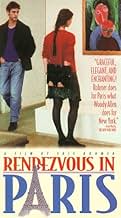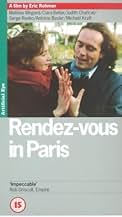IMDb RATING
7.2/10
2.6K
YOUR RATING
Three stories of love and coincidence around the theme of dates in Paris.Three stories of love and coincidence around the theme of dates in Paris.Three stories of love and coincidence around the theme of dates in Paris.
- Awards
- 2 nominations total
- Director
- Writer
- All cast & crew
- Production, box office & more at IMDbPro
Storyline
Did you know
- TriviaWhile at the Cimetiere St. Vincent, they visit the grave of Theophile Alexandre Steinlen who was a Swiss-born French Art Nouveau painter and print-maker.
Featured review
What is love? and can you explain it. Using three meetings at different locations , Rohmer creates a parable on the intricate and surprising nature of love. The first story about a rendezvous at seven is the best. Insidious in its nature, it plants the seeds of doubt that blossom into the tale of two women and two men, each seeking and expecting divergent results. Filled with coincidences, all three tales are, it presents the surprises we don't see coming.
The second story which is kind of dull or more demanding depending on taste, follows a couple meeting up in many public locations. The female character is afraid to meet in private despite the urgings of her male lover and when she does make the leap, the consequences will forever change the relationship.
The goat of the pack is the final vignette, a story titled after a Picasso painting that features prominently in story. Again the obvious is pushed aside for the unexpected and there is a certain breezy, plush ending to the proceedings that seems to jar with what has become.
A comedy in three parts, there is a chorus group that is interspersed and opens each story. Cherubic in nature, the songs present certain adages on the nature of love and life.
A mixture of his moral tales with his comedies and proverb series, it is the lesser of each but sub-par Rohmer is still superior to most filmmakers. His low frills style of film making which a previous reviewer called cheap tells him how little he knows about the edict of the French New wave, the only die-hard adherent remained Rohmer, his rules, a quantifier closer to the Dogma'95 tradition of cinema. It is cinema of the heart at its finest.
The second story which is kind of dull or more demanding depending on taste, follows a couple meeting up in many public locations. The female character is afraid to meet in private despite the urgings of her male lover and when she does make the leap, the consequences will forever change the relationship.
The goat of the pack is the final vignette, a story titled after a Picasso painting that features prominently in story. Again the obvious is pushed aside for the unexpected and there is a certain breezy, plush ending to the proceedings that seems to jar with what has become.
A comedy in three parts, there is a chorus group that is interspersed and opens each story. Cherubic in nature, the songs present certain adages on the nature of love and life.
A mixture of his moral tales with his comedies and proverb series, it is the lesser of each but sub-par Rohmer is still superior to most filmmakers. His low frills style of film making which a previous reviewer called cheap tells him how little he knows about the edict of the French New wave, the only die-hard adherent remained Rohmer, his rules, a quantifier closer to the Dogma'95 tradition of cinema. It is cinema of the heart at its finest.
- How long is Rendez-vous in Paris?Powered by Alexa
Details
Box office
- Gross US & Canada
- $730,099
- Opening weekend US & Canada
- $36,471
- Aug 11, 1996
- Runtime1 hour 38 minutes
- Color
- Aspect ratio
- 1.37 : 1
Contribute to this page
Suggest an edit or add missing content






















